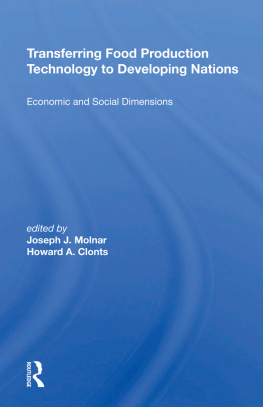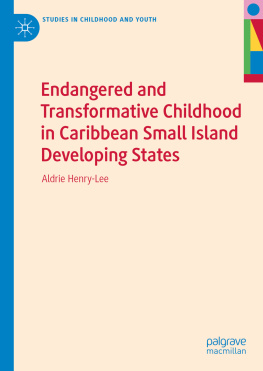First published 1999 by Ashgate Publishing
Reissued 2018 by Routledge
2 Park Square, Milton Park, Abingdon, Oxon OX14 4RN
711 Third Avenue, New York, NY 10017, USA
Routledge is an imprint of the Taylor & Francis Group, an informa business
Copyright Beate Lohnert and Helmut Geist 1999
All rights reserved. No part of this book may be reprinted or reproduced or utilised in any form or by any electronic, mechanical, or other means, now known or hereafter invented, including photocopying and recording, or in any information storage or retrieval system, without permission in writing from the publishers.
Notice:
Product or corporate names may be trademarks or registered trademarks, and are used only for identification and explanation without intent to infringe.
Publishers Note
The publisher has gone to great lengths to ensure the quality of this reprint but points out that some imperfections in the original copies may be apparent.
Disclaimer
The publisher has made every effort to trace copyright holders and welcomes correspondence from those they have been unable to contact.
A Library of Congress record exists under LC control number: 99073621
ISBN 13: 978-1-138-61111-5 (hbk)
ISBN 13: 978-1-138-61112-2 (pbk)
ISBN 13: 978-0-429-46364-8 (ebk)
Hans-Georg Bohle
Professor of Geography, University of Heidelberg, Sdasien Institut, Abteilung Geographie, Im Neuenheimer Feld 330, D-69120 Heidelberg, Germany.
Florian Dnckmann
Geography (Ph. D.), University of Kiel, Geographisches Institut, Ludewig-Meyn-Strasse 14, D-24098 Kiel, Germany.
Helmut Geist
Geography (Ph. D.), German-American Center for Visiting Scholars, 1607 New Hampshire Avenue, NW, Washington, D.C. 20009, United States of America.
Barbara Gbel
Anthropology (Ph. D.), University of Bonn, Seminar fr Vlkerkunde, Rmerstrasse 164, D-53117 Bonn, Germany.
Thomas Krings
Professor of Development Studies, University of Freiburg, Institut fr Kulturgeographie, Werderring 4, D-79085 Freiburg i. Br., Germany.
Fred Krger
Professor of Geography, University of Erlangen-Nrnberg, Geographie, Kochstr. 4, D-91054 Erlangen, Germany.
Beate Lohnert
Geography (Ph. D.), University of Osnabrck, Fachgebiet Geographie, Seminarstrasse 19, D-49069 Osnabrck, Germany.
Matthias K. B. Ldeke
Physics (Ph. D.), Potsdam Institute for Climate Impact Research, Integrated Systems Analysis Department, P.O. Box 601203, D-14412 Potsdam, Germany.
Gerhard Petschel-Held
Physics (Ph. D.), Potsdam Institute for Climate Impact Research, Integrated Systems Analysis Department, P.O. Box 601203, D-14412 Potsdam, Germany.
Fritz Reusswig
Sociology (Ph. D.), Potsdam Institute for Climate Impact Research, Global Change and Social Systems Department, P.O. Box 601203, D-14412 Potsdam, Germany.
Sven Schade
Geography (Ph. D.), University of Bayreuth, Geographisches Institut, Universittsstrasse 30, D-95440 Bayreuth, Germany.
Veronika Ulbert
Geography (Ph. D.), Friedrich-Ebert-Stiftung, Stabsabteilung, Godesberger Allee 149, D-53175 Bonn, Germany.
One of the major objectives of DFGs research priority programme on the social dimensions of global environmental change (SPP 194) was - and still is - the provision of an organizational framework for researchers from various fields of study to join task forces. Among the five task forces organized for the total of three periods covering 1995 to 2000, most of the contributions in this volume directly originate from the activities of Task Force 5 entitled Environmental Perception and Coping Strategies in Endangered Ecosystems of the Developing World. A minor part of the contributions prove to be strongly related to the SPP activities of task force 5 in that non-DFG affiliated researchers from related fields either got irrepressibly attracted by and heavily involved into task force activities (by simply having attended one or all of the DFGs numerous colloquia and workshops) or partly even worked under close supervision of SPP members under their own budget.
While task force 5 started as a group of social researchers coming from a wide field of scientific disciplines (including geography, anthropology, sociology and demography), from the very first set up of the organizational framework it was clear that - different from other task forces - the special focus will not only be a thematical one, but more so explicitly related to empirical investigations among social groups in different areas in what is commonly known as the developing world. More so, from numerous meetings and discussions since about 1996 it emerged that special attention is well worth to be given to the notions of environmental perception, (un)sustainability, livelihood systems and vulnerability by relating them to the more action oriented and strategic aspects of global environmental change - with particular reference to what natural scientists use to call endangered ecosystems - however, in next to all cases not giving a proper format to the human dimensions involved.
At the highlighting meeting in Osnabrck in May 1998, there was common ground originating from the observation that one of the task forces major objectives since 1995, i.e., categorizing research results as originating from individual SPP projects, should be left behind. It was agreed upon that in future a further and rather daring step should be tried towards aggregating the combined efforts aimed at the integration of views upon ecosystem, perception and social strategy in the form of a publication as presented here. The emphasis so far given to what could be called the meso and micro level of social analysis, i.e., nations, regions, markets, state, social groups and even individual households, was not seen to be a major obstacle when dealing with the world-wide (or macro) dimensions of changing environments, but more so a necessary drive towards scaling down both the processes and effects of global (environmental) change. The point has to be made here that the special emphasis in this volume upon -and the particular devotion given in individual chapters to - the social or human dimensions of environmental change is seen to easily shape the bulk of future activities in a field of research that has longly been dominated by the natural scientists perspective (and access to funds). Together with the compelling need to strengthen the regional component, and adhering to Thomas Kuhns (1962) notion with abandon, the editors would never have run into this editorial enterprise if not convinced that paradigmatic change happens.
It should be mentioned that, if not stated otherwise, all translations from sources originally written in German and cited in the text fall under the full responsibility of the editors as it is with any omissions or typographical errors.
Beate Lohnert, Mazabuka and Osnabrck
Helmut Geist, Neuss and Washington, DC
Note
1 Access to further information on SPP 194 (Schwerpunktprogramm Globale Umweltvernderungen: Sozial- und verhaltenswissenschaftliche Dimensionen) of the Deutsche Forschungsgemeinschaft (DFG) is provided by internet (in English). The homepage including links, products, task forces, objectives, participants, projects, events and news is ;, while further information on task force 5 can be found via ;.












